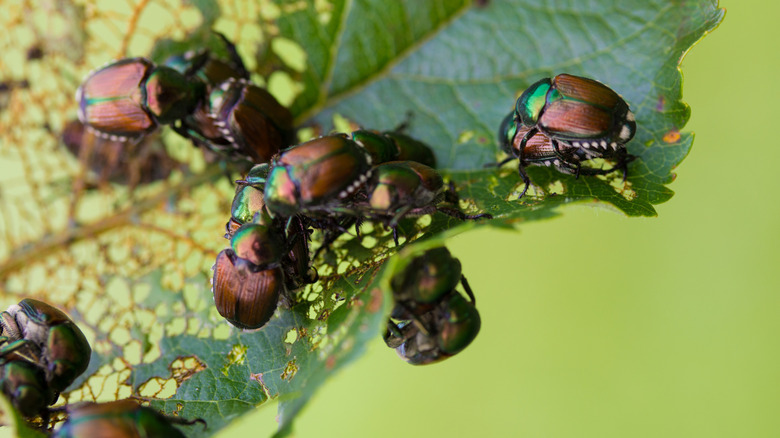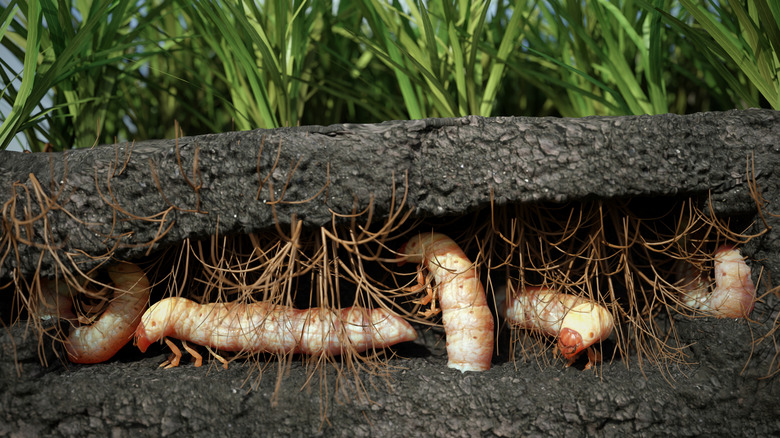Japanese Beetles Are Ready To Start Attacking Maine Gardens. Here's What To Do About It
If you've spent the last couple of months curating and growing a healthy garden, the last thing you want to see are small green invaders munching on the leaves. Japanese beetles, those shiny green and copper insects, are emerging across Maine and wasting no time, turning lush gardens into remnants of their former glory. These beetles may look harmless, but don't be fooled. They feed in massive groups, stripping leaves down and diminishing your plant's beauty. Their preferred menu includes everything from roses and grapes to raspberries, cherries, and beans — meaning even your hardiest crops aren't safe.
Their timing couldn't be worse either. July through August marks peak growing season in Maine, when flower beds are in full bloom and vegetable gardens are thriving. That's exactly why Japanese beetles choose this window to strike, as it provides them with a buffet of choices. The adults have already started surfacing and their feeding can last up to six weeks or more, and these pests don't discriminate when it comes to plants, consuming perennials and edible greenery alike. For gardeners who want to enjoy a picture-perfect growing season, the sudden appearance of these beetles can feel like an ambush, especially if you're unprepared. While the invasion is alarming — there's no need to panic just yet. There are a few steps that you can take to fight back and protect your blossoming garden. And while these beetles may return next year, you can significantly reduce their numbers with a few garden care tips. But first, it's important to understand why these bugs keep returning to your yard to better understand the steps you may need to take to stop them from gorging on your greenery.
Why are these beetles back?
You might be wondering how Japanese beetles keep making their way back to your garden in Maine, especially after you've tried every trick in the book — even using essential oils to keep pesky beetles out. Japanese beetles have a stubborn life cycle that makes them nearly impossible to eradicate in a single season. After mating in the summer, female beetles lay their eggs in the soil, which then hatch into grubs that feed on grass roots during the fall. When winter finally hits, these grubs burrow deeper into the ground to survive the cold. They emerge in the spring to complete their development into fully grown adults. By July, they're ready to ravage your garden and start the mating process all over again.
Mild winters in Maine have helped their populations flourish. Typically, the first frost forces the grub population deeper into the soil, leaving less survivors during colder years. However, without those freezing temperatures, more of the grub population is able to survive this overwintering process and reproduce the next summer. Their ability to travel also makes it difficult to effectively target specific populations of Japanese beetles, as they can fly several miles in search of food. While you may be able to get rid of them for one year, they can reproduce nearby and simply return the following summer to feed on your garden. These factors contribute to an excessive beetle population problem, but how can you make a difference in your garden?
How to prevent them from wreaking havoc
The most effective strategy for handling Japanese beetle populations is starting underground. Targeting grubs before they have a chance to mature can drastically reduce beetle numbers that next summer. If you're looking for a natural solution, you may want to try applying nematodes around your lawn that will attack these populations and effectively kill them off. Additionally, milky spore powder is known to specifically target Japanese beetles themselves, and not other species. However, it may take up to three years to see a prominent decline of Japanese beetles in your garden.
If you're already dealing with an adult infestation, there are a few methods of pest control that you can try. Floating row covers can shield your most vulnerable plants during peak feeding seasons, stopping the beetles from attacking your garden. In the early morning, you can hand pick any obvious beetles off your plants and dispose of them properly to prevent breeding. Using garlic to keep Japanese beetles off your plants has proven effective as a natural insecticide. Planting other companion plants like lavender or catnip may also deter beetles from infesting your garden. You'll want to avoid using commercial beetle traps close to your home, as they will actually attract more beetles to a given yard. For long term solutions, keep a close eye on your vulnerable plants like roses, grapevines, and fruit trees. With a little planning and persistence, you can stop these shiny invaders from turning your curated summer garden into their personal buffet.


